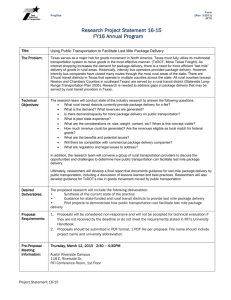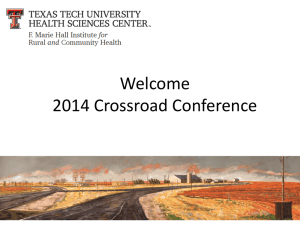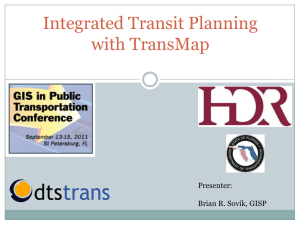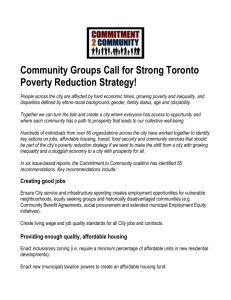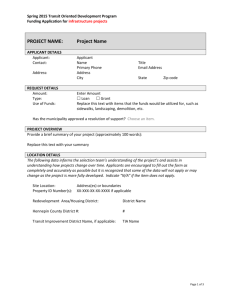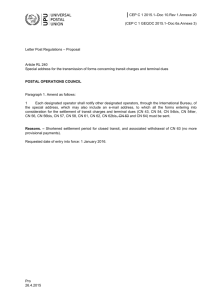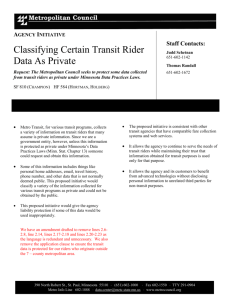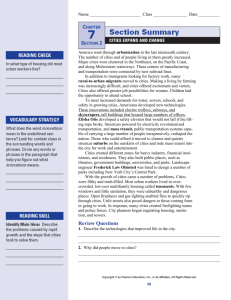PS16-6Fracking Effects on Texas Rural Public Transit
advertisement
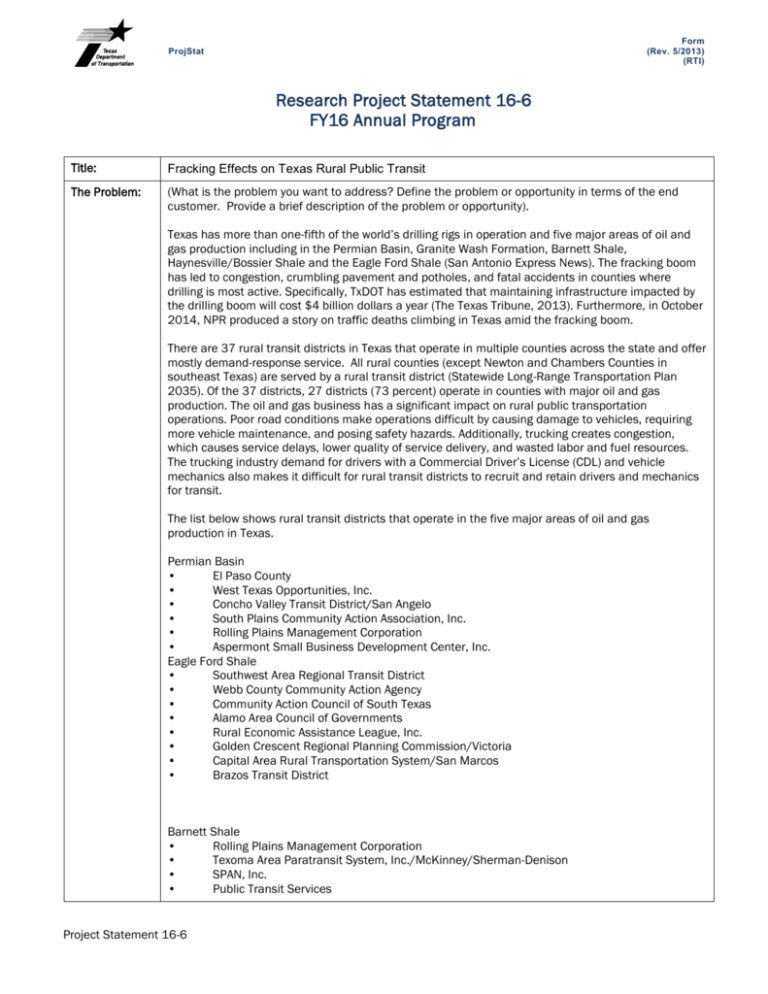
Form (Rev. 5/2013) (RTI) ProjStat Research Project Statement 16-6 FY16 Annual Program Title: Fracking Effects on Texas Rural Public Transit The Problem: (What is the problem you want to address? Define the problem or opportunity in terms of the end customer. Provide a brief description of the problem or opportunity). Texas has more than one-fifth of the world’s drilling rigs in operation and five major areas of oil and gas production including in the Permian Basin, Granite Wash Formation, Barnett Shale, Haynesville/Bossier Shale and the Eagle Ford Shale (San Antonio Express News). The fracking boom has led to congestion, crumbling pavement and potholes, and fatal accidents in counties where drilling is most active. Specifically, TxDOT has estimated that maintaining infrastructure impacted by the drilling boom will cost $4 billion dollars a year (The Texas Tribune, 2013). Furthermore, in October 2014, NPR produced a story on traffic deaths climbing in Texas amid the fracking boom. There are 37 rural transit districts in Texas that operate in multiple counties across the state and offer mostly demand-response service. All rural counties (except Newton and Chambers Counties in southeast Texas) are served by a rural transit district (Statewide Long-Range Transportation Plan 2035). Of the 37 districts, 27 districts (73 percent) operate in counties with major oil and gas production. The oil and gas business has a significant impact on rural public transportation operations. Poor road conditions make operations difficult by causing damage to vehicles, requiring more vehicle maintenance, and posing safety hazards. Additionally, trucking creates congestion, which causes service delays, lower quality of service delivery, and wasted labor and fuel resources. The trucking industry demand for drivers with a Commercial Driver’s License (CDL) and vehicle mechanics also makes it difficult for rural transit districts to recruit and retain drivers and mechanics for transit. The list below shows rural transit districts that operate in the five major areas of oil and gas production in Texas. Permian Basin • El Paso County • West Texas Opportunities, Inc. • Concho Valley Transit District/San Angelo • South Plains Community Action Association, Inc. • Rolling Plains Management Corporation • Aspermont Small Business Development Center, Inc. Eagle Ford Shale • Southwest Area Regional Transit District • Webb County Community Action Agency • Community Action Council of South Texas • Alamo Area Council of Governments • Rural Economic Assistance League, Inc. • Golden Crescent Regional Planning Commission/Victoria • Capital Area Rural Transportation System/San Marcos • Brazos Transit District Barnett Shale • Rolling Plains Management Corporation • Texoma Area Paratransit System, Inc./McKinney/Sherman-Denison • SPAN, Inc. • Public Transit Services Project Statement 16-6 Form (Rev. 5/2013) (RTI) ProjStat • The Transit System, Inc. • Central Texas Rural Transit District • City/County Transportation • Community Services, Inc. • Heart of Texas Council of Governments • Hill Country Transit District Granite Walsh Formation • Panhandle Community Services, Inc. Haynesville/Bossier Shale • East Texas Council of Governments • Brazos Transit District TxDOT Public Transportation Division (PTN) needs to understand the financial, safety, and environmental impacts (among others) to the 27 rural public transportation providers that operate in counties where fracking is prevalent. Technical Objectives: To understand fracking industry effects on rural transit systems in Texas, researchers will conduct case study research with a selection of affected transit agencies operating in each of the five major areas of oil and gas production in Texas. Through data collection, site visits, and survey research, researchers will gather and analyze information related to the following seven topic areas: Cost of fuel and time due to delay Vehicle maintenance On-time performance Labor resources and costs Accidents Emissions Insurance costs To draw conclusions, researchers will compare data from before the fracking boom to the most available data in each of the topic areas. Researchers will investigate other states with major oil and gas production and document lessons learned and best practices as applicable. The final research product will be documented effects and suggested recommendations in a final report. Desired Deliverables: The proposed research will include the following products: Case study research documenting effects of fracking on Texas rural transit agencies in agreed upon topic areas; supplemented by survey research as necessary Final report documenting effects and recommendations to transit agencies and TxDOT-PTN Proposal Requirements: 1. Proposals will be considered non-responsive and will not be accepted for technical evaluation if they are not received by the deadline or do not meet the requirements stated in RTI’s University Handbook. 2. Proposals should be submitted in PDF format, 1 PDF file per proposal. File name should include project name and university abbreviation. Pre-Proposal Meeting Information: Thursday, March 12, 2015 , 2:30 - 4:30PM Austin Riverside Campus 118 E. Riverside Dr. RTI Conference Room, 1st Floor Webex Information: 1. Go to https://txdot.webex.com/txdot/j.php?MTID=mc669233957a14bab20c53fdbb558b22e 2. If requested, enter your name and email address. 3. If a password is required, enter the meeting password: 1234 Project Statement 16-6 ProjStat Form (Rev. 5/2013) (RTI) 4. Click "Join". Teleconference information; Provide your phone number when you join the meeting to receive a call back. Alternatively, you can call: Call-in toll-free number: 1-(866) 637-1408 (US) Conference Code: 426 158 5995 Notifying RTI of Intent to Propose: In order to be notified if additional project information is distributed by TxDOT, you must contact RTI, at (512) 416-4730 or rtimain@txdot.gov by February 27, 2015 if you plan to propose. Proposal Deadline: Proposals are due to RTI by 4:00 p.m. Central Time, April 3, 2015. Email submissions should be sent to rtimain@txdot.gov. Project Statement 16-6
